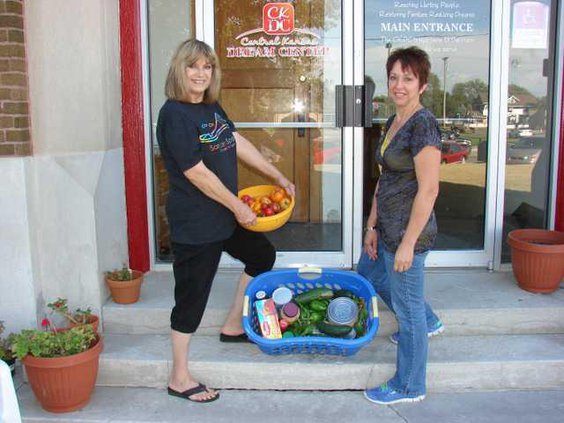The Central Kansas Dream Center (CKDC) recently received garden produce from members of the Grass Roots Environmental Advocacy Team (GREAT). CKDC operates the Hungry Heart Soup Kitchen and other faith-based social services at the old Roosevelt Junior High School building on Broadway, Great Bend. The Soup Kitchen serves lunch to about 70 persons on weekdays. CKDC also provides faith-based human services meeting immediate and long-term needs in the areas of homelessness, hunger relief, life controlling issues and education, including shelter for women and women with children. GREAT is a local environmental organization whose members come from a wide variety of backgrounds including business, public service, agriculture, faith and more.
Felix Revello, facilitator for GREAT, explains their members are responding to the obvious need for fresh produce by low income citizens, a nationwide concern. “Some might be surprised that an environmental group is interested in the hunger issue. But, hunger, as so many challenges to our Nation, is linked to environmental concerns… one of the biggest being waste of perfectly wholesome food. USDA tells us that, from farm to table, about 10% of our Nation’s energy, 25% of our water and 50% of our land are dedicated to producing the astonishing abundance of food we enjoy. When you consider how efficient our farmers are, it’s disheartening to learn that about 40% of their produce is wasted while 49 million Americans struggle to put food on the table and one out of five children lives in food insecure families. Most of this wasted food rots in landfills generating about 16% of the methane emitted by our country. Methane is many times more powerful than carbon dioxide as a greenhouse gas. So, food waste contributes significantly to Climate Change.
GREAT members figure from our own experience that a lot of produce grown by home gardeners is also wasted. So, those of us who are gardeners can contribute homegrown vegetables and fruit to feeding centers and food banks to feed others while reducing resource consumption, food waste and pollution.
“We encourage our members and friends in our communities to donate good produce, whether from garden or grocery, that we know we won’t get around to eating before it goes bad... helping others while improving our environment”, Revello said.
Kimberly Becker, Director of the Dream Center, says that, “The Hungry Heart Soup Kitchen enthusiastically accepts garden produce Monday through Friday. Even small amounts that individual gardeners bring in are welcome. Of course, canned goods are appreciated too because of the huge need. Many people don’t realize that we have homeless people sleeping under bridges right here in Great Bend.” The Soup Kitchen is open to deliveries at their dining area attached to the northeast corner of the Roosevelt School from 10 a.m. to 1 p.m. Enter from the middle door on the north side of the building from a gravel parking area accessed from Williams Street). Outside those hours, they can receive food from 8 a.m. to 5:30 p.m. through the west (Stone Street) entrance of main building.
The global impact of food waste is immense. Industrialized nations like America and Britain waste 1.5 trillion pounds of food every year, which is equal to the entire net food production of sub-Saharan Africa. Production loss worldwide is another major cause of hunger; 48 million more people could be fed by African farmers if those countries had more efficient harvesting processes and adequate storage, packaging and distribution infrastructure. The amount of food wasted worldwide every year could feed 3 billion people; so, reducing waste and loss would significantly reduce the strain on agricultural systems to feed the world in the future.
Hungry Heart Soup Kitchen





